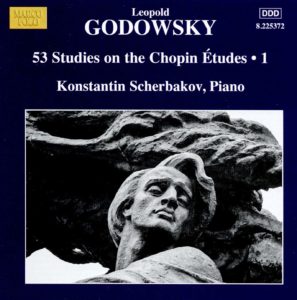Konstantin Scherbakov has been working his way through Leopold Godowsky’s complete solo piano oeuvre for the Marco Polo label since 1996. With Volume 14, the cycle finally arrives at the composer’s (in)famous studies on the Chopin Etudes. Here, each Chopin original is represented by one corresponding Godowsky transformation. Although the Godowsky/Chopin playing field boasts strong reference-worthy editions from Emanuele Delucchi, Carlo Grante, and Marc-André Hamelin, Scherbakov equals these luminaries in most matters.
He dispatches the opposite-direction arpeggios in the C major piece based on Op. 10 No. 1 with maximum clarity and minimum pedal, imparting lilting definition to the triple meter. The A minor “Ignis Fatuus” is firmly etched but not quite so supple as Hamelin’s, but the thanklessly difficult C-sharp minor Op. 10 No. 4 for left-hand alone features felicities of voicing and emphasis not heard in other renditions.
Of the seven Godowsky “Black Key” Etude options, Scherbakov chooses the first, where the left and right hand functions in Chopin’s original text are essentially switched around; Scherbakov’s evenness and elegance simply delights. He keeps the left-hand E-flat minor’s main melody and swirling, multi-regsitral filigree in perfect perspective, although the Op. 10 No. 7 Toccata sounds a bit square next to David Saperton’s more playful accentuations. Scherbakov’s hard-hitting way with Godowsky’s less interesting Op. 10 No. 8 two-handed concoction allows for no lyrical respite.
If I prefer Hamelin’s lighter touch in the C-sharp minor Waltz transformation of Chopin’s Op. 10 No. 9, Scherbakov’s slower conception of Op. 10 No. 10 for left hand alone allows the serpentine inner voices more breathing space. Scherbakov’s effortlessly soaring No. 25 (the best of Godowsky’s various studies based on Op. 25 No. 1) is one of this release’s high points. It’s followed by rather less engaging interpretations of Etudes 27 and 29, but Scherbakov fully captures the idiomatic spirit of Op. 24 No. 4’s Polonaise treatment and the Op. 25 No. 5 as Mazurka study.
It’s no reflection on Scherbakov’s fabulous technique that David Saperton’s utterly insouciant left-hand double thirds in No. 36 remain unchallenged. Yet Scherbakov’s charged bravura and dynamic contrasts set new expressive standards in the left-hand versions of Op. 25 No. 10 and the F minor Nouvelle Etude. In the sublime No. 45 variations in E major based on the A-flat Nouvelle Etude, Scherbakov controls the complex textures and polyrhythms well, but I miss the independent linear strands that Ian Hobson brought out in his 1985 Arabesque recording, not to mention the late, great Robert Helps’ extraordinary multi-layering mastery and probing expression. On the whole, a stellar achievement, and I look forward to Scherbakov tackling (as well as caressing!) the remaining Godowsky/Chopin Studies.
































